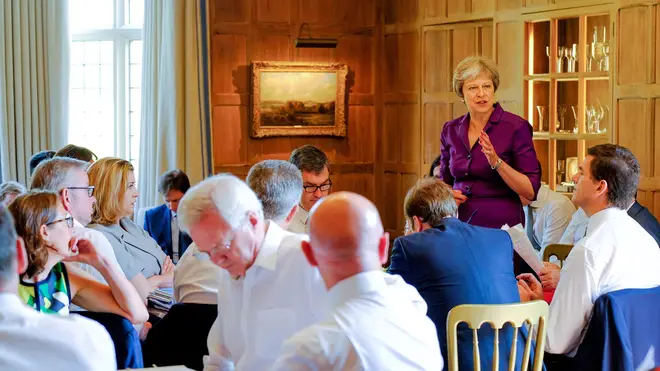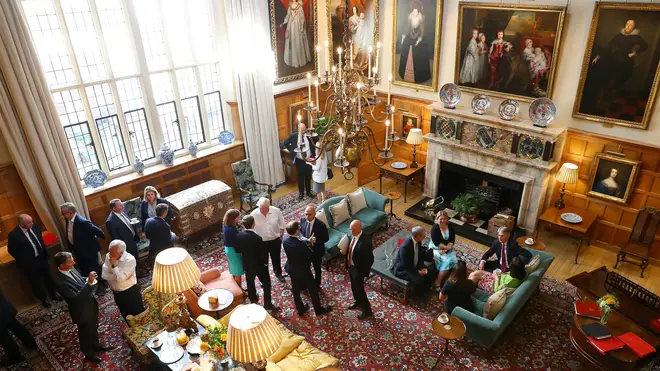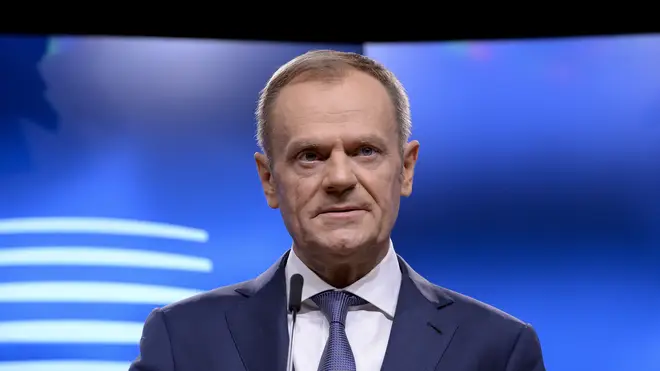
Ben Kentish 7am - 10am
8 October 2018, 17:16 | Updated: 28 October 2019, 15:53

The Brexit proposal that Theresa May is putting forward to the EU has been met with strong opposition from some Brexiteers and EU negotiators, but what is the 'Chequers deal?
Chequers is the Buckinghamshire residence for the Prime Minister. But more recently, Chequers has come to refer to the Brexit deal struck between cabinet ministers and Theresa May during a summit held at the residence earlier this year.
Cabinet ministers at the meeting, held on the 6th and 7th of July, reached an agreement on what kind of relationship the UK wants with the European Union after Brexit, and this is the UK's proposal put forward to EU negotiators.
But Michel Bariner has since made clear that the plan was unacceptable, with Labour MP Stephen Kinnock reporting that the EU's chief negotiation called it 'dead'.
Click here for LBC's Brexit timeline.
The deal reached between ministers and Theresa May, which is also known as 'the Prime Minister's deal' or the 'Chequers deal', is made up of 12 points. They mean that the UK would keep close ties with the EU, creating an EU-UK free-trade area and a common rulebook. There would be no freedom of movement and no paying the EU, but the UK could still strike other trade deals.
The 12 points that make up the Chequers proposal are:
1. Leaving the European Union on the 29th March 2019.
2. Ending free movement and taking back control of our borders.
3. No more sending vast sums of money each year to the EU.
4. A new business friendly customs model with freedom to strike new trade deals around the world.
5. UK-EU free trade area with a common rulebook for industrial goods and agricultural products which will be good for jobs.
6. Commitment to maintain high standards on consumer and employment rights and the environment.
7. Parliamentary lock on all new rules and regulations.
8. Leaving the Common Agricultural Policy and Common Fisheries Policy.
9. Restoring the supremacy of British courts by ending the jurisdiction of the European Court of Justice in the UK.
10. No hard border between Northern Ireland and Ireland, or between Northern Ireland and Great Britain.
11. Continued close cooperation on security to keep our people safe.
12. An independent foreign and defence policy working closely with the EU and other allies.

In a statement, the government said that Cabinet Ministers 'collectively agreed the UK's vision' for its future relationship with the European Union.
In addition to Theresa May, the Cabinet at the meeting was: Jeremy Hunt, David Davis, Michael Gove, Liam Fox, Penny Mordaunt, Gavin Williamson, Boris Johnson, Sajid Javid, Damian Hinds, Karen Bradley, Philip Hammond, Claire Perry, Caroline Nokes, Esther McVey, and Chris Grayling.
But the Cabinet Ministers were reshuffled following the resignation of the then-Brexit Secretary David Davis and then-Foreign Secretary Boris Johnson resigned in the days after the deal was made. Mr Davis was first to resign, and mid-way through an interview with Iain Dale when the news broke that Mr Johnson had followed suit.
The European Union's proposal to the UK was for Northern Ireland to remain in the customs union, which would create a customs border between the island of Ireland and the rest of the UK.
Theresa May had proposed a 'backstop' customs system with facilitated customs arrangements in order to avoid a hard Irish border.
But European Council president Donald Tusk said the plan needed to be "reworked", saying that "there will be no Withdrawal Agreement without a solid, operational and legally binding Irish backstop."
"We agreed to have a joint political declaration that provides as much clarity as possible on the future relations," he said.
“Everybody shared the view that while there are positive elements in the Chequers proposal, the suggested framework for economic cooperation will not work. Not least because it risks undermining the single market."

After Donald Tusk accused her proposals of "undermining the single market", Theresa May gave a statement in Downing Street where she pointed her finger at the EU.
"Yesterday, Donald Tusk said our proposals would undermine the single market. He didn't explain how in any detail or make any counter-proposal. So we are at an impasse," she said.
"At this stage in the negotiations it is not acceptable to simply reject the other side's proposals without a detailed explanation and counter proposals, so we now need to hear from the EU, what the real issues are and what their alternative is so that we can discuss them, until we do we cannot make progress."
“I can tell you absolutely, unequivocally, without a shadow of a doubt that Chequers is dead in the water. Michel Barnier made it crystal clear that Chequers is completely unacceptable to the EU,” Stephen Kinnock said.
But Theresa May and Philip Hammond have insisted that the agreement is still very much alive.
Speaking to Nick Ferrari from the Conservative Party Conference, the Chancellor of the Exchequer said: "There is an absolute will to reach an agreement with the United Kingdom."
He also said that he knew the European Union wouldn't agree to Chequers, but is willing to work with them to find common ground.
"We knew they wouldn't like it because it tests their red lines, it challenges all their preconceptions," he said.
"But if they've got specific problems with it, come back to us and we'll work it through with them."
Boris Johnson and David Davis both resigned from the Cabinet after the Chequers proposal was agreed.
Mr Johnson has been critical of the deal in a number of newspaper columns, and has called it 'intellectual humiliation'.
Jacob Rees-Mogg has repeated calls for the Prime Minister to drop the plan, describing it as the "dirty Harry" option
Former Ukip leader Nigel Farage has also been critical of the plan, calling for Theresa May to 'chuck Chequers'.